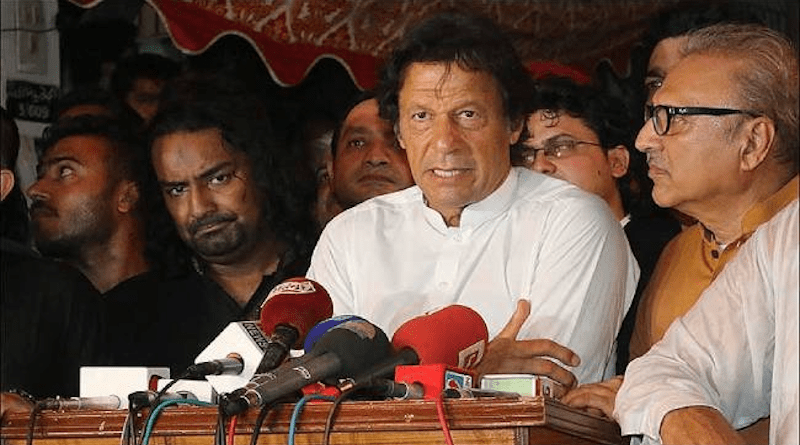Imran Khan’s Populist Narrative Is No More – OpEd
The essence of politics is to serve the people in the most honorable and honest manner. Politics is more of problem resolution mechanism within a group, a community, society and at the level of state. In the civilized societies, the problem solving mechanism involves adoption of peaceful ways and means. Indirectly, the essence of politics is service of the people while making use of best practices.
For decades the Pakistani politics has been peaceful and decent at least while dealing with people and state. However, Imran Khan’s PTI has changed this trend and started targeted campaign against state institutions in order to accomplish political objectives. There have been narrative buildings against state institutions and rival groups. All this was done at the behest of Imran Khan and his party.
The May 9 sporadic violent attacks against the armed forces installations in Pakistan by the angry youthful followers of Imran Khan in a frenzied reaction to his humiliating arrest are unprecedented in the history of Pakistan. Most provocative was the desecration and destruction of the memorials of the valiant heroes and martyrs of various wars with India. Even a politically ‘reluctant’ and moderate high brass of the armed forces could not take such defiance of its power and honour with patience. Quite intriguing was the exceptional patience of the military high command in the face of such a violent provocation by not-so-big but furious crowds to perhaps ostensibly avoid a bloody showdown with the enraged Punjabi youth. May 9 incident put the political future of its hand-made illiberal populist leader Imran Khan, in serious jeopardy. His party PTI couldn’t take an initial serious jolt and has crumbled like a house of cards. In just a matter of few days, Mr Khan’s second and middle-level leaders have left the party while condemning the attacks on May 9 by party workers.
It seems that after successfully running a “foreign conspiracy to dislodge him with domestic facilitators” narrative on his ouster through an otherwise constitutional in-house change, he has lost all his wits. The allies in PDM Government found a great opportunity to capitalize on Imran Khan’s shenanigan and adventurism of his amateur anarchist cult followers. The double gamble that Imran Khan played, first by wooing the army’s high command to resume its patronage and then threatening it to succumb to his pressure from within and retired military personnel, finally backfired when he crossed the Rubicon.
The mass defections in PTI remind one of the similar way innumerable electable politicians in their hoards were ‘persuaded’ to join Mr Khan’s popular bandwagon just before the 2018 elections. Imran Khan’s dramatic rise to and treacherous fall from power is not an exceptional phenomenon, though it carries some very unique and conflicting traits. When populism seeps into the mass psychology of fascism, it’s difficult to unravel it without demolishing all those traits of a cult that are eulogized by the masses. Compared to Zulfikar Ali Bhutto’s radical populism mixed with authoritarian tendencies, Imran Khan’s illiberal populist appeal combines quite diverse facets and instinctive fascinations among various age groups of men and women.
As prime minister for over three and a half years, Imran Khan enjoyed being on the “same page” with the Army leadership until he tried to outsmart his benefactors who got extremely disenchanted with his clueless poor governance. Surrounded by sycophants and fortune-seekers, the Kaptan not only failed to deliver on any promise, except fixing his opponents and the media. He did not let any leader emerge in the provinces he governed, nor allowed a worthwhile team to flourish. Now, he is left with a disorganized mass of chaotic youth without any ideology and any measure of organization at any level.
What makes the current political imbroglio more pervasive is an all-out crisis of the political economy and the unsustainability. The current crisis is further fueled by the anti-state narrative of Imran Khan. Post-Bajwa military under COAS General Asim Munir had vowed to keep aloof from politics, but Imran Khan forced it to run out of patience, and the May 9 ‘mutiny’ has drawn a red line that will have its own adverse consequences on a fragile democratic transition.
Targeting own institutions and blaming them over flimsy grounds is not a sane thought particularly coming from senior politician who had been PM of the country. Pakistan needs a complete overhaul of the system to restore public trust in the state institutions for good governance. Once the trust of the public in the state institutions is restored, there is no more politics involved in the governance, and there is transparency and accountability in the system, Pakistan will be on the track towards a peaceful, stable and prosperous country.
The writer is Islamabad based expert of political affairs

